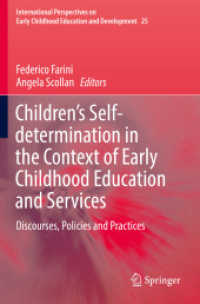Full Description
According to the World Health Organization's 2008 GLOBOCAN report, 64% of global cancer deaths -- and 56% of cancer cases -- were registered in countries in Africa, Asia, or Latin America. So while cancer is unquestionably a global burden, its reach in the developing world points to the need for specialized study on cancer in these countries.
Cancer Epidemiology: Low- and Middle-Income Countries and Special Populations reviews the current status of cancer epidemiologic research and training -- rationale, requisite infrastructure, methodologic principles, and illustrative examples in low- and middle-income countries -- in order to facilitate future advances by trained health professionals. The result is a valuable resource for both program leaders and graduate and post-graduate students pursuing careers in international cancer epidemiologic research.
Contents
Section 1: Multidisciplinary Perspectives ; 1. Burden of Cancer in Low- and Middle-Income Countries ; Maria Paula Curado, Paolo Boffetta, David Schottenfeld, Jean-Marie Dangou, Karina Braga Ribeiro ; 2. Migrant Studies ; Song-Yi Park and Laurence N. Kolonel ; 3. Molecular Epidemiology Studies in Cancer ; Kelly Hirko, Maria Iniesta Donate, Sofia Merajver ; 4. Opportunities for Cancer Genetic Research ; Oluwafemi Oluwole, Yonglan Zheng, Olufunmilayo Olopade ; 5. Cancer Screening in Low- and Middle-Income Countries ; R. Sankaranarayanan, Somanathan Thara, Youlin Qiao, Twalib Ngoma, Raul Murillo ; 6. Behavioral, Social, and Cultural Aspects of Epidemiologic Studies in Low- and Middle-Income Countries and in Special Populations ; Robert Chamberlain ; 7. Ethical Issues in Cancer Epidemiologic Studies ; Steven S. Coughlin ; Section 2: Methodological Principles in Conducting International Studies ; 8. Case-control Studies in Low- and Middle-Income Countries ; Farin Kamangar, Kyle Esdaille, Farhad Islami ; 9. Cohort Studies in Low- and Middle-Income Countries ; Stephanie Melkonian, Yu Chen, Habibul Ahsan ; 10. Molecular Epidemiology in LMIC ; Hongbing Shen and Hongxia Ma ; 11. Methodological Issues in International Multicentric Studies, Including the Role of Consortia in International Cancer Epidemiology ; Farhad Islami and Paolo Boffetta ; Section 3: Cancer Epidemiology Research Training in LMI Countries and Special Populations: Needs and Opportunities ; 12. Cancer Epidemiology Research Training in LMI Countries and Special Populations: Needs and Opportunities ; Amr Soliman ; 13. Cancer Epidemiology in Schools of Public Health and Medical Schools: Culture, Infrastructure, and Curricula ; Amr Soliman ; 14. University Resources for Academic and Field Research Training in Cancer Epidemiology ; Amr Soliman and Robert Chamberlain ; 15. Non-University Training Programs in Cancer Epidemiology, Emphasizing Participation from LMI Countries ; Jessica Fapeol-Badger ; 16. Needs and Opportunities for Epidemiologic Training of Early-career Clinicians and Scientists Seeking to Conduct Cancer Research in LMI Countries ; Amr Soliman and Robert Chamberlain ; Section 4: Illustrative Examples of Collaborative Field Studies ; 17. Hepatitis B Virus, Aflatoxin and Primary Liver Cancer ; W. Thomas London, Timothy M. Block, Katherine A. McGlynn ; 18. HPV and Cervical Cancer ; Rolando Herrero ; 19. Studies of Tobacco Smoking and Control ; Priscilla S. Reddy, Shamagonam James, Nasheen Naidoo, Ronel Sewpaul, Ken Resnicow, and Anthony Mbewu ; 20. Cancer and HIV in Less Developed Countries ; Sam M. Mbulaiteye ; 21. Breast Cancer Early Detection and Clinical Guidelines ; David B. Thomas, Raul H. Murillo, Kardinah, and Benjamin O. Anderson ; Section 5: Future Directions: Emerging Opportunities and Challenges ; 22. Future Directions: Emerging Opportunities and Challenges ; Amr S. Soliman, David Schottenfeld, and Paulo Boffetta








